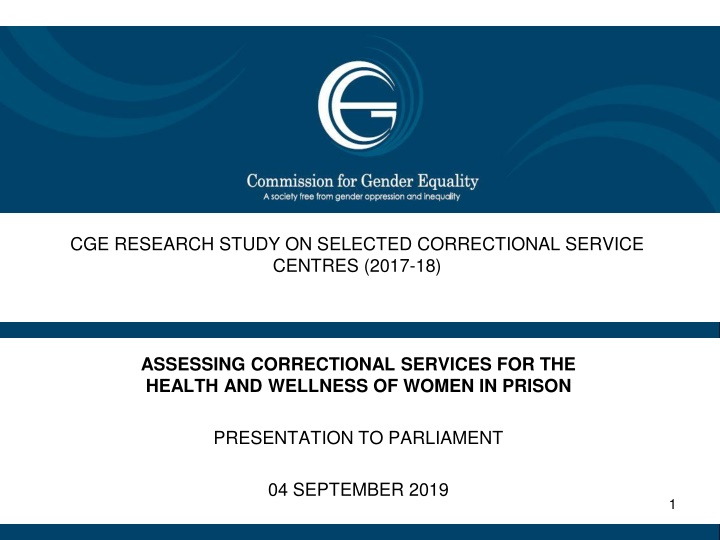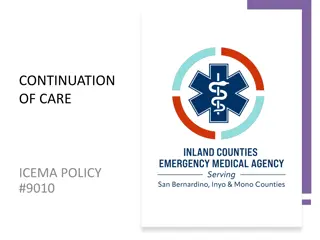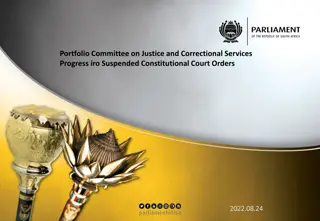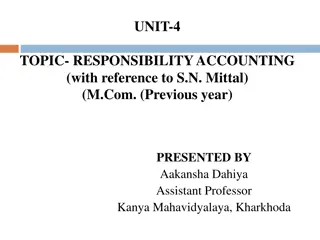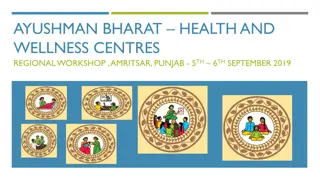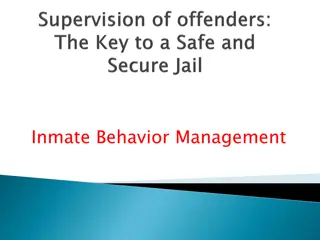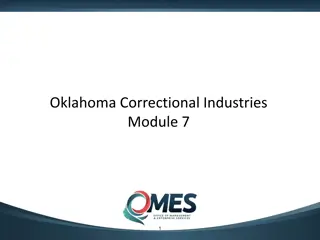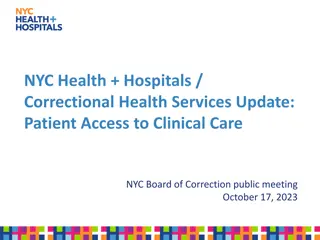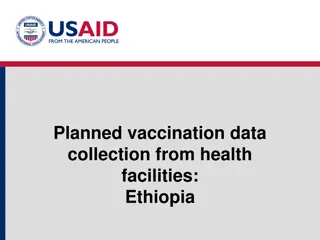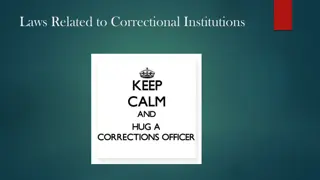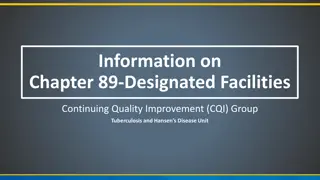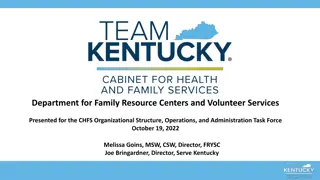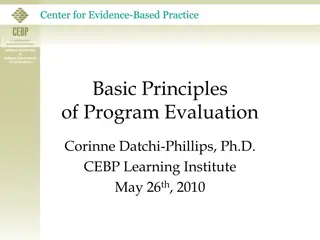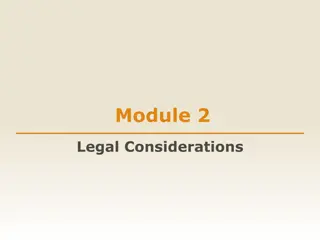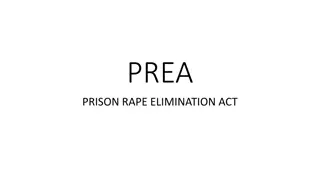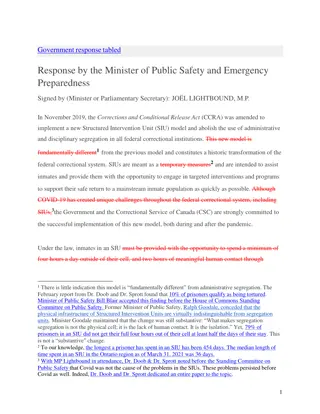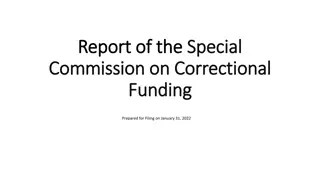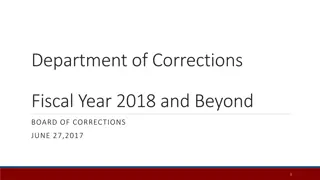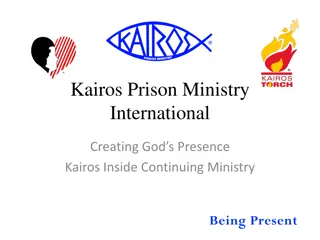Assessment of Correctional Services for Women's Health in Selected Centers (2017-18)
This research study conducted by the Commission for Gender Equality (CGE) focuses on evaluating the correctional services provided to women in prison from a health and wellness perspective. The study emphasizes the importance of upholding human rights and gender equality within correctional facilities. Various informants were interviewed, and site observations were carried out to assess the quality of health care services and the overall conditions of the facilities. The study is guided by a qualitative research approach and aims to make recommendations to Parliament based on its findings.
Download Presentation

Please find below an Image/Link to download the presentation.
The content on the website is provided AS IS for your information and personal use only. It may not be sold, licensed, or shared on other websites without obtaining consent from the author.If you encounter any issues during the download, it is possible that the publisher has removed the file from their server.
You are allowed to download the files provided on this website for personal or commercial use, subject to the condition that they are used lawfully. All files are the property of their respective owners.
The content on the website is provided AS IS for your information and personal use only. It may not be sold, licensed, or shared on other websites without obtaining consent from the author.
E N D
Presentation Transcript
CGE RESEARCH STUDY ON SELECTED CORRECTIONAL SERVICE CENTRES (2017-18) ASSESSING CORRECTIONAL SERVICES FOR THE HEALTH AND WELLNESS OF WOMEN IN PRISON PRESENTATION TO PARLIAMENT 04 SEPTEMBER 2019 1
CGE MANDATE SA Constitution: S187 of the Constitution require the CGE to promote respect for, and the protection, development and attainment of gender equality CGE Act No 39 of 1996: The CGE mandate is to monitor and evaluate legislation, policies and practices of the state, statutory bodies and private businesses, as well as indigenous and customary laws and practices; research and make recommendations to Parliament; receive and investigate complaints of gender discrimination; and conduct public awareness and education on gender equality. CGE has powers of subpoena and litigation. PEPUDA Act 4 of 2000: Obligates the CGE to institute proceedings of unfair discrimination on the grounds of gender Vision: The CGE vision is a society free from gender oppression and all forms of inequality 2
RELEVANT LEGISLATIVE FRAMEWORK Constitution of the Republic of South Africa (1996) The Department of Correctional Services Act, No 111 of (1998) The White Paper on Corrections (2005) The DCS Health Care Policy and Procedures (2014). SADC Protocol on Health (1999). SADC Minimum Standards for HIV/AIDS, Tuberculosis, Hepatitis B and C and STIs Prevention, Treatment, Care and Support in Prisons (2009) United Nations Standard Minimum Rules for the Treatment of Prisoners (the Mandela Rules) United Nations Office on Drugs and Crime, United Nations Rules for the Treatment of Women Prisoners and Noncustodial Measures for Women Offenders (the Bangkok Rules), 2010. 3
RESEARCH METHODOLOGY The purpose of the study was to assess the extent to which the Department of Correctional Services (DCS) is upholding the human rights of female inmates in their correctional facilities from a health perspective The study was based on the qualitative research approach Six Correctional Centres were selected for this study Among the informants interviewed were Warders, Social Workers, Psychologists, Psychiatrists, Nursing staff, Nutritionists, Medical Doctors, Correctional Centre Managers & Officials in the National DCS Health Directorate 4
RESEARCH METHODOLOGY cont. Site observations were also conducted in line with issues raised by the Judicial Inspectorate for Correctional Services (JICS); as well as the provisions relevant legislation (e.g. National Health Act, 2003 No 61 of 2003) on the physical and operational state of the facilities and health care services currently rendered to female inmates. Focus group discussions were conducted Warders and female inmates separately at each Correctional Centre. In-depth interviews were also conducted with various officials at the various Correctional Centres as well as senior officials from the National DCS Health Directorate. 5
RESEARCH METHODOLOGY Correctional Centres Province No. of Inmates per FGD No. of Warders per FGD No. of Officials interviewed Free State 10 5 4 Bizzah Makhate W. Cape 9 8 5 Pollsmoor Gauteng 9 5 4 Johannesburg KZN 10 6 6 Durban Westville Limpopo 8 8 5 Thohoyandou N. West 8 6 6 Potchefstroom 6
RESEARCH METHODOLOGY cont All interviews were conducted in English (with translation conducted by CGE staff were necessary), A set of semi-structured and open-ended interview questions to allow inmates and other officials to engage with the Research Staff. In cases where possible, supporting documents (e.g. policy documents, annual reports, budgets information and plans, etc.) were obtained and analysed by the Research Team to compile the reports. Participation in the study guided by the following considerations: Voluntary participation Informed consent Confidentiality & anonymity Two Research Reports were compiled (2017 & 2018) 7
LIMITATIONS The controlled nature of the prison environment had the potential to prevent inmates from speaking freely to the researchers without fear of repercussions. In some Centres (e.g. Bizzah Makhate and Johannesburg) some of the Specialists, including the Doctors, were unavailable to be interviewed Site visits to the different Correctional Centres were limited only three days only. In many instances cooperation was not freely forthcoming from many officials both at the various Centres and at national level to provide relevant supporting documents 8
RESEARCH FINDINGS: JOHANNESBURG CORRECTIONAL CENTRE (Gauteng) Approved capacity of the centre is 613 inmates. Number of sentenced inmates was 698; remand offenders 278 Total inmates: 976 therefore there was overcrowding of 59.2% Section C1 accommodates the Mother ad Baby unit with 21 mothers and babies. Section B which houses medium term offenders was more overcrowded than any other section of the facility There is a general problem of shortage of hot water due to aging infrastructure; but the overall facility looked neat. SOME OF THE HEALTH CARE AND RELATED SERVICES RENDERED TO FEMALE INMATES Health Care and related Services The Centre s initial screening process for offenders (once admitted) included oral and physical examinations The oral assessments focussed on the health history of the offender, including current illnesses; communicable diseases (e.g. TB and HIV and AIDS); mental health; hypertension; cardiac condition; diabetes; epilepsy; etc. The second phase involves the physical examination with a focus on the physical condition, including pregnancy status. 9
Johannesburg Correctional Centre Continued. Pregnant offenders are immediately booked in the hospital section of the facility until they have delivered the babies either at Baragwanath or Lilian Ngoyi Hospital, then moved to the Mother and Baby unit The mothers and their babies receive all antenatal programmes and post-natal services from these hospitals; escorted by Correctional officers. The nurses usually involve social workers to obtain the baby charts from families if babies were born prior to incarceration Some inmates were provided with anti-viral treatment in cases of HIV/AIDS infection; TB screening was compulsory, including frequent screenings and treatment for sexually transmitted diseases (STIs); chicken pox outbreaks and skin problems. However during the focus group discussions with offenders, most offenders made refereed to only oral examination being conducted and no physical examinations. There were complaints of lack of adequate medical supplies (e.g. inmates receiving only Ibuprofen or Panado tablets for pain irrespective of the nature of the ailments) Inmates complained of the negative attitudes/scorn from the nursing staff and the medical personnel Issues regarding inadequate access to medical facilities, including failure to provide medical prescriptions on time from the Centre Doctor) 10
Johannesburg Correctional Centre Continued. Psychological programmes; projects and services. Clinical psychologists provided the necessary psychological services based on referrals from either the Doctor, nurses or social workers. Major areas of treatment for inmates, especially those who are mothers, included depression, anxiety and difficulties of parenting behind bars and inability to attend family events. Social work programmes. Social workers were responsible for the Centres Social Work and related services to cope with the incarceration, including providing young mothers with parenting skills. Some of the programmes were intended to assist mothers with children to cope with the separation from their children after the age of 2 years; The social work programme assisted with putting children into foster care, or working with embassies in the case of foreign nationals to ensure placement of young children in their countries of origin During focus group discussion with the inmates, they were largely happy with social work services provided by the Centre. 11
Johannesburg Correctional Centre Continued. Nutrition and Personal Hygiene services. Meals were provided on a daily basis In some cases, the nursing staff prescribe the necessary diets for sick offenders based on the Therapeutic manual The food was prepared by the offenders under supervision of nutritionist. However, during Focus Group Discussion with many inmates complained about the poor preparation of the food. Offenders were also provided with sanitary towels from the DCS and inmates were largely satisfied with this. Resources and Staff capacity for the Centre. The majority of the Centre staff were females 13 Women and 1 Man in the Centre Management 7 Nurses (all female) 3 Social workers (all female) 3 Psychologists (all female) 2 Psychiatrists (all female). 12
Johannesburg Continued staff capacity All officials complained about work overload, and having to work for long hours In some cases, the lack of staff caused the Centre to rely on local NGO s to provide assistance Skills training for Centre Staff/Officials The DCS did provide some general skills training to all Centre officials, especially The Correctional Centre expected all officials and specialist service providers to have knowledge of relevant legislative frameworks that guides the work of the DCS and other relevant departments such as Department of Health, (e.g. the Nurses were guided by the Nursing Act). Any other skills training needed, especially for specialist service providers such as the clinical psychologists, psychiatrist and social workers, these were to be provided by external agencies and professional associations to which they belonged. 13
RESEARCH FINDINGS: BIZZAH MAKHATE FEMALE CORRECTIONAL CENTRE (Free State) The Centre had the capacity to accommodate 216 inmates but had a total population of 189 (163 sentenced and 26 remand detainees) Therefore the Centre did not have a problem of overcrowding at the time of the study. The Centre was in a state of good repair and generally kept clean. Cells were adequately ventilated and sufficiently illuminated through windows in each cell. There appeared to be no shortage of facilities/amenities including beds, storage, ablution and sanitation facilities. The Centre also appeared be complying with the National Health Act No. 61 of 2003 in terms of providing for the health and sanitation needs of the inmates. However the food preparation area had a shortage of equipment and was generally small and appeared dilapidated. 14
BIZZAH MAKHATE FEMALE CORRECTIONAL CENTRE CONT GENERAL HEALTHCARE PROGRAMMES, PROJECTS AND SERVICES. There was provision of general healthcare services for the female inmates at the Centre. On arrival, female inmates were assessed and issues covered including pregnancy status, gestational period; last menstrual cycle; last immunisations administered to babies; and others. Assessments also focused on the history of healthcare such as childhood illnesses; history of sexual assault and rape; chronic medication; and the last date of pap smear taken by the women. However, the CGE found inconsistencies in relation to the application of these assessments procedures. Focus group discussion with inmates revealed that not all inmates were assessed according to prescribed procedure. Many inmates pointed out that only oral assessments were carried out, without the physical examinations. The lack of the physical examination placed inmates at risk of catching contagious diseases. 15
BIZZAH MAKHATE FEMALE CORRECTIONAL CENTRE CONT Some of the health risks and challenges included: undetected pregnancies; inmates who defaulted on their antiretroviral treatments for HIV/AIDS; untreated sexually transmitted diseases; and inmates detained without their chronic medication; Pregnant inmates were given antenatal care services from local hospitals (i.e. Boitumelo hospital), including post-natal treatment and immunisation of babies The hospital section of the Centre provided primary health care to babies; even though some of the mothers complained about the quality of medical care, and that their babies were continuously sick. Mothers complained about the shortage of milk formula which was supplied irregularly, and shortage of clothing for their babies. The centre relied on donations from local NGOs Women-specific health care services were provided to inmates, including annual pap smears and mammograms. HIV/AIDS testing and treatment were also administered to both mothers and babies 16
BIZZAH MAKHATE FEMALE CORRECTIONAL CENTRE CONT The CGE found that while the nurses were readily available for consultations with inmates, the Centre Doctor was not always available except on Tuesdays (he was responsible for 14 Centres in the region). The nurses therefore had to carry the workload of some of the responsibilities of the Doctor, or refer severe cases to nearby hospitals. The inmates did have access to other health care specialists such as optometrists, oncologists and dentists at local hospitals such as Boitumelo Regional Hospital, Universitas Hospital and the National District Hospital. 17
BIZZAH MAKHATE FEMALE CORRECTIONAL CENTRE CONT Psychological programmes, projects and services. The Centre insisted that it provided and cared for all the needs of all offenders through provision of a range of psychological services to cope where needed. However some of the inmates were not aware of the psychological services provided at the centre. Center officials stated that referrals for psychological services are made through either a nurse or a social worker However, many inmates complained of failure to refer inmates with mental health problems to psychologists Many inmates felt that the nursing staff did not perceive mental health illness as serious. Inmates pointed out that depression among female inmates was common, especially among inmates concerned about the welfare of their families and their children. It appeared that due to heavy workloads, the Centre psychologist was unable to attend to many of the inmates on a regular, consistent and long term basis (At the time of the study, the psychologist was responsible for 14 Centres) 18
BIZZAH MAKHATE FEMALE CORRECTIONAL CENTRE CONT Social work programmes, projects and services. The Centre s Social Worker was responsible for a programme that provided interventions to assist inmates with domestic issues. Many females inmates struggled to cope behind bars Inmates who had left young children and spouses behind suffered from extreme cases of separation anxiety and depression. Relevant programmes were therefore offered to inmates in areas such as anger management; substance abuse; marriage, family and relationship counselling. 19
BIZZAH MAKHATE FEMALE CORRECTIONAL CENTRE CONT Nutrition and Personal hygiene services The Centre appeared to cater for the unique hygiene needs of the female inmates through the provision of sanitary towels, toiletries such as tooth paste, toilet papers, etc. In terms of nutrition, a female nutritionist based at the Centre designed a special dietary programme for the inmates. However some of the inmates complained about poorly cooked meals. Some of the inmates also claimed that the Centre did not cater for the specific nutritional needs of pregnant and lactating women. 20
BIZZAH MAKHATE FEMALE CORRECTIONAL CENTRE CONT Resources and staff capacity for the Centre Centre officials indicated that the Centre s budgetary allocation was inadequate to cater for the health and welfare needs of the inmates. The officials referred to the constant shortages of relevant equipment and supplies (e.g. kitchen equipment and personal hygiene items/products). It was pointed out that much of the Centre s medical equipment was donated by an NGO called The Right to Care. Some of the officials felt that the staff complement of the Centre was limited and that there was a need to create more posts cope with the workload. The Centre s Psychologist and the Doctor were responsible for 14 other Correctional Centres in their management area. 21
BIZZAH MAKHATE FEMALE CORRECTIONAL CENTRE CONT Skills training and capacity building for Officials The Centre had not provided its personnel (Warders) with ongoing skills training to deal with the unique needs and human rights of female inmates. It was found that the Centre s Warders were ill prepared to handle female inmates, and were sometimes harsh and insensitive to their needs and circumstances. Some of the inmates related their experiences with Centre security/Warders who would regularly dismiss their ailments as attention-seeking tactics , and would thus deny requests to seek medical attention. The Centre s Security/Warders were largely uninformed about the health and reproductive rights of the female inmates. The lack of training for the Warders was attributed to the cost cutting measures that were being implemented by the DCS at the time of the study. The nurses, social worker and clinical psychologist were provided training through their respective professional organisations, and were therefore better able to handle and deal with the healthcare and reproductive needs of the females inmates. 22
RESEARCH FINDINGS: POLLSMOOR FEMALE CORRECTIONAL CENTRE (Western Cape) The Pollsmoor Correctional Centre appeared to have old/aging infrastructure, and in some sections water leaks from the roof were observed, including paint peeling off from the ceilings. However, overall the facility was kept clean and well taken care of. The Centre was providing for the needs of the female inmates, including the needs of the inmates with small babies through its the Mother and Baby Unit. Most Communal cells, especially those for remand inmates, were not in a good state of affairs, although the single cells were in a good state. It was noted that the Centre had a major problem of overcrowding, with the single in some cases accommodating 3 offenders at a time While smoking officially prohibited, the inmates indicated many smoked and that smoking inside communal cells exposed other inmates to the dangers of second-hand smoking. The Centre had a 10-bed hospital in the premises; its consultation and voluntary counselling and testing (VCT) room were accredited anti-retroviral (ARV) sites. 23
POLLSMOOR FEMALE CORRECTIONAL CENTRE conti.. HEALTH RELATED PROGRAMMES, PROJECTS, AND SERVICES FOR FEMALE INMATES The medical screening of offenders as they enter prison was regarded as a critical part of the admissions process for determining the health condition of inmates and detecting health related risks. The Centre had 1 in-house Doctor (available twice a week), 2 sessional Doctors & 4 in- house Nurses. The inmates complained about the nurses not being easily accessible, thus limiting the availability of medical care services to inmates at all times. In cases of emergencies, the Centre referred patients to Groote Schuur or Victoria Hospitals, However, some of the inmates claimed that one has to be dying before being referred to the hospitals. The Centre did provide the inmates services such as pap smears, ante-natal care, post- natal care, etc. Babies born to mothers within the facility were sent to a nearby Westlake Clinic for immunisation. 24
POLLSMOOR FEMALE CORRECTIONAL CENTRE conti.. Psychological programmes and services Centre had an on-site psychologist who rendered psychological services to the inmates referred by the social workers. These services were praised by inmates although access to the psychologist was seen as inadequate. Social Work programmes, projects, and services Inmates had access to social work services, even though, according to some of the officials, the process of placing babies outside the Centre (once they reach the age of 2 years) often took too long to complete. Nutrition and Personal hygiene Services Some of the inmates complained about the poor quality of the meals Pregnant women and mothers with babies were placed on a different nutritional programme, so did not have the same complaints. All female offenders in focus group discussions complained of lack of adequate sanitary towels. The inmates revealed that during their menstruation periods, the Warders applied the Show and I give practice of rationing the supply of sanitary towels due to shortages. 25
POLLSMOOR FEMALE CORRECTIONAL CENTRE conti.. Resources and Staff Capacity for the Centre The Centre s officials complained about lack of adequate budgetary resources Centre officials also argued that the Mother and Baby Unit had limited resources, and relied on donors and relatives of the inmates to contribute supplies such as baby clothes and toiletries. The officials also insisted that due to shortage of staff, they faced severe work overload and needed more staff capacity to deliver services to inmates effectively. Skills Training and Capacity Building for Officials Some of the officials indicated that only rudimentary training was offered during induction, Officials pointed to lack of training especially to handle challenges related to mental health issues and disability, including gender related skills training. 26
RECOMMENDATIONS In order to address the issue of inadequate training and capacity building, it is recommended that the DCS should carry out a skills audit of key personnel that work directly with inmates in order to develop a clear long term skills development strategy. This can be done by approaching the Safety and Security Sector Education and Training Authority (SASSETA) for funding and develop a training programme that would focus on gender equality and human rights. The long-term skills strategy should be supported by the development of annual skills plans with clear allocations of financial resources, with a focus on knowledge on how to handle the specific needs of female inmates. That DCS should carry out a thorough needs analysis of its centres, to determine the optimal number of all specialists to carry out functions for caring for female inmates, especially their mental health status. DCS should develop as clear programme of collaboration with relevant NGOS s in the sector to augment for the limited resources at their disposal. Owing to the realization that prison-cell overcrowding contributes to the burden on prison resources and exacerbates the transfer of communicable diseases, greater efforts to reduce overcrowding such as diversion programmes for women and juveniles offender from the criminal justice system is recommended. DCS should formulate a policy to regulate the supply and distribution of toiletries including sanitary towels. This policy should contain clear and suitable guidelines on the quality and quantity of sanitary towels to be provided within an appropriate period of time. 27
The End 28
